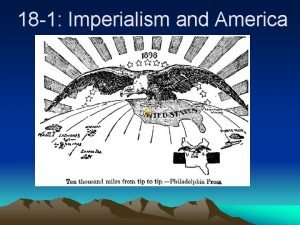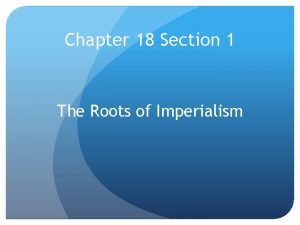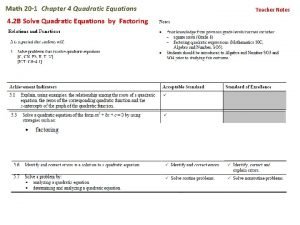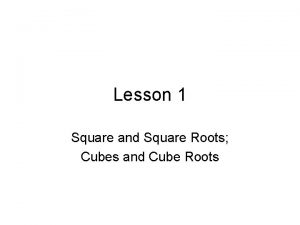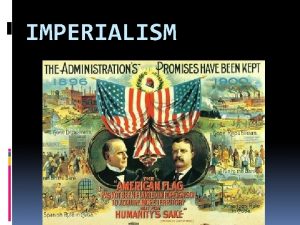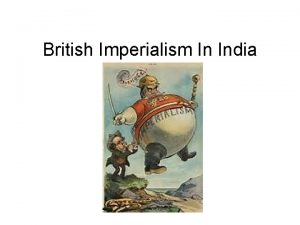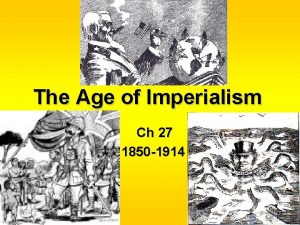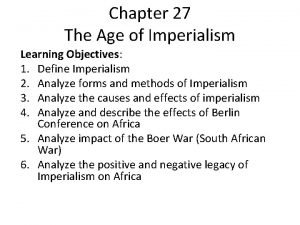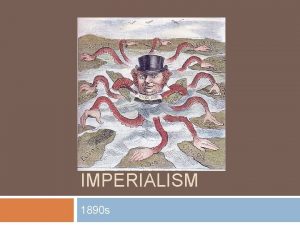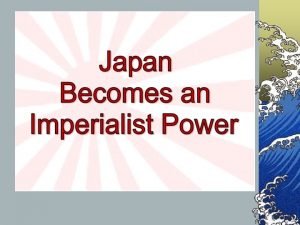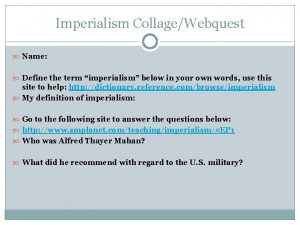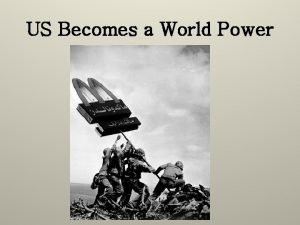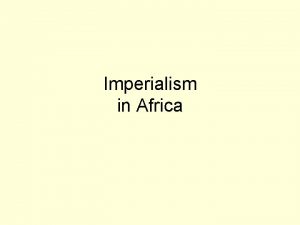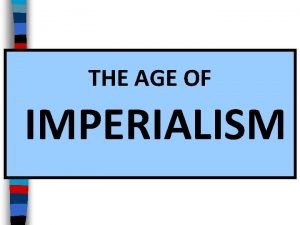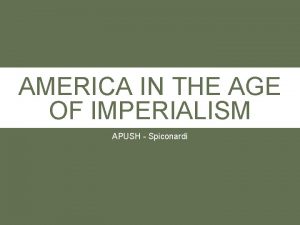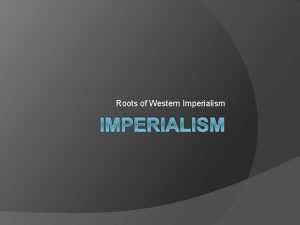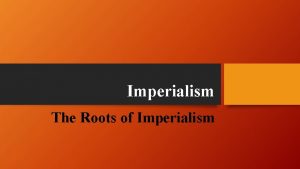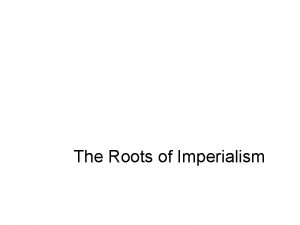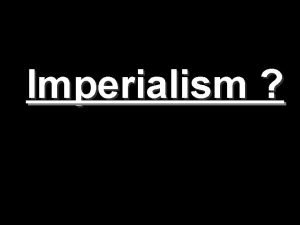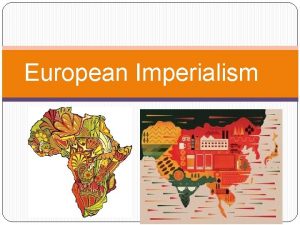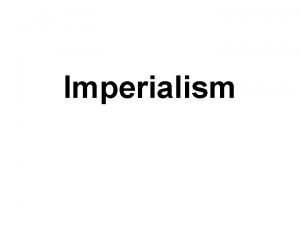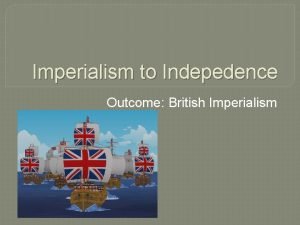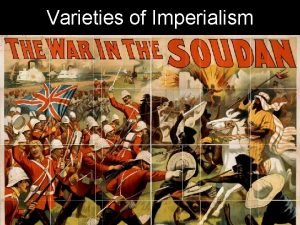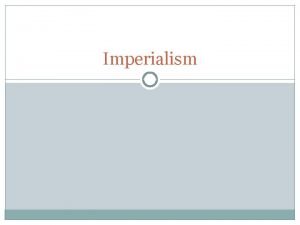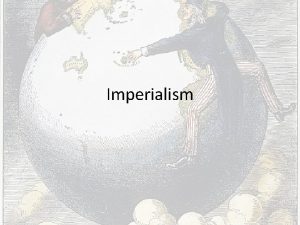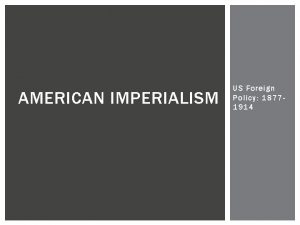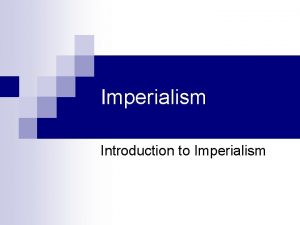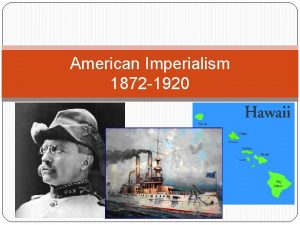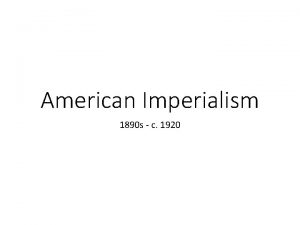US IMPERIALISM ROOTS OF IMPERIALISM I Roots of


























- Slides: 26

US IMPERIALISM ROOTS OF IMPERIALISM

I. Roots of Imperialism A. Imperialism 1. The policy in which stronger nations extend their economic, political, or military control over weaker territories.

2. By the end of the 1800 s, this was a worldwide trend. a. European countries needed raw materials (copper, rubber, and tin) to fuel industrial growth, and new markets for manufactured goods.

b. Only Ethiopia and Liberia remained independent in Africa. c. Japan competes with European countries for China. d. This global competition warmed Americans to overseas expansion

B. Reasons for American Imperialism 1. Desire for Military Strength and Military Interest a. Since other nations were establishing a global military presence, many leaders suggested the US do the same.

b. Alfred T. Mahan 1. Wrote The Influence of Sea Power Upon History. 2. Called for: a. Developing a modern navy to protect business and shipping interests.

b. Establish naval bases in the Caribbean. c. Construct a canal across the Isthmus of Panama.

d. acquire Hawaii and other Pacific Islands.

2. Need for New Markets a. US produced more than it could consume. Colonies could be a solution to overproduction. a. Need new markets to prevent economic panics and depressions

3. Social Darwinism and White Man’s Burden a. Free market competition would lead to the survival of the fittest, and a belief in the racial superiority of Anglo. Saxons.

b. The idea that Americans had a special mission to uplift “backward” and “ignorant” people around the world while spreading Christianity.

4. American Frontier Closed a. US pioneer spirit looks toward foreign interests. Expand or Explode.

II. Seward’s Folly A. In 1867, Secretary of State William Seward purchased Alaska from Russia for $7. 2 million. 1. Twice the size of Texas, 2 cents an acre.

2. Frozen wasteland “Seward’s Folly. ” 3. Found gold, and other valuable resources like fur, timber, minerals, and Oil. B. Also in 1867, the US annexed the Midway Islands.

III. Annexation of Hawaii A. American missionaries went to Hawaii in the 1820 s. Their children and grandchildren became sugar planters who sold crops to the US. 1. Hawaiian sugar production increases greatly when allowed to sell duty free in the US. a. Gets taken away with Mc. Kinley Tariff (1890), and planters want US to annex Hawaii.

B. By 1887, US leaders already got Hawaii to let the US use Pearl Harbor as a naval base. C. Hawaii’s King Kalakaua was forced to amend Hawaii’s constitution by white planters. Limiting voting rights to wealthy landowners

D. Queen Liliuokalani becomes queen after her brother dies. (1891) 1. “Hawaii for Hawaiians. ” 2. Wanted to remove property owning qualifications for voting.

E. To prevent this, Sanford Dole, US Ambassador John Stevens, and US Marines overthrew the queen. 1. President Cleveland refused annexation. 2. President Mc. Kinley and US Congress annex Hawaii and make it a territory in 1898. 3. Becomes the 50 th state in 1959.

IV. Foreign Policy in Asia A. Japan 1. The US and Japan signed a trade agreement in 1858. 2. Many leaders favored industrialization, and started becoming industrialized in 1868.

3. By 1890, Japan started becoming an imperial power. a. 1894 - Sino-Japanese War 1. Japan defeats China, and got same trading rights in China as European countries.

b. 1904 - Russo-Japanese War 1. Japan leads a sneak attack and defeats Russian Navy in the Pacific. 2. Japan gets Korea and Port Arthur in China. 3. Japan is now a world power.

B. Foreign Powers in China 1. European countries and Japan took advantage of China’s weakness by seizing Spheres of Influence, areas where national controlled resources.

a. Germany, Britain, France, Japan, and Russia all took control of areas.

2. Open Door Policy a. policy put forth by Secretary of State John Hay in 1899. b. US policy that stated all nations should have equal acccess to trade in China.

C. Boxer Rebellion 1. Chinese nationalists who were angered by foreign involvement in China. a. “Fists of Righteous Harmony” 2. Boxers took to the streets of Beijing, laid seige to where foreigners lived and killed 200 people. 3. Foreign military forces, including US Marines, had to put down the rebellion.

4. China forced to pay $333 million to foreign governments, including $25 million to the U. S. 5. Open Door Policy will remain intact until WWII.
 Economic roots of american imperialism
Economic roots of american imperialism Old imperialism vs new imperialism
Old imperialism vs new imperialism Motives of old imperialism
Motives of old imperialism Roots of american imperialism
Roots of american imperialism Imperialism and america chapter 18 section 1
Imperialism and america chapter 18 section 1 Roots part i
Roots part i Existence and uniqueness of square roots and cube roots
Existence and uniqueness of square roots and cube roots Quadratic equation with roots
Quadratic equation with roots Vanessa jason biology roots answer key
Vanessa jason biology roots answer key Perfect cube list
Perfect cube list Imperialism
Imperialism Types of imperialism
Types of imperialism Imperialism in india
Imperialism in india Chapter 27 the age of imperialism
Chapter 27 the age of imperialism Carcy writing
Carcy writing American imperialism political cartoons explained
American imperialism political cartoons explained Japanese jeopardy
Japanese jeopardy Chapter 27 building vocabulary the age of imperialism
Chapter 27 building vocabulary the age of imperialism Imperialism defintion
Imperialism defintion Treaty of kanagawa
Treaty of kanagawa Causes of imperialism
Causes of imperialism Imperialism defintion
Imperialism defintion What's the difference between colonialism and imperialism
What's the difference between colonialism and imperialism Causes of new imperialism
Causes of new imperialism Different types of imperialism
Different types of imperialism Imperialism
Imperialism Seward's icebox apush
Seward's icebox apush
